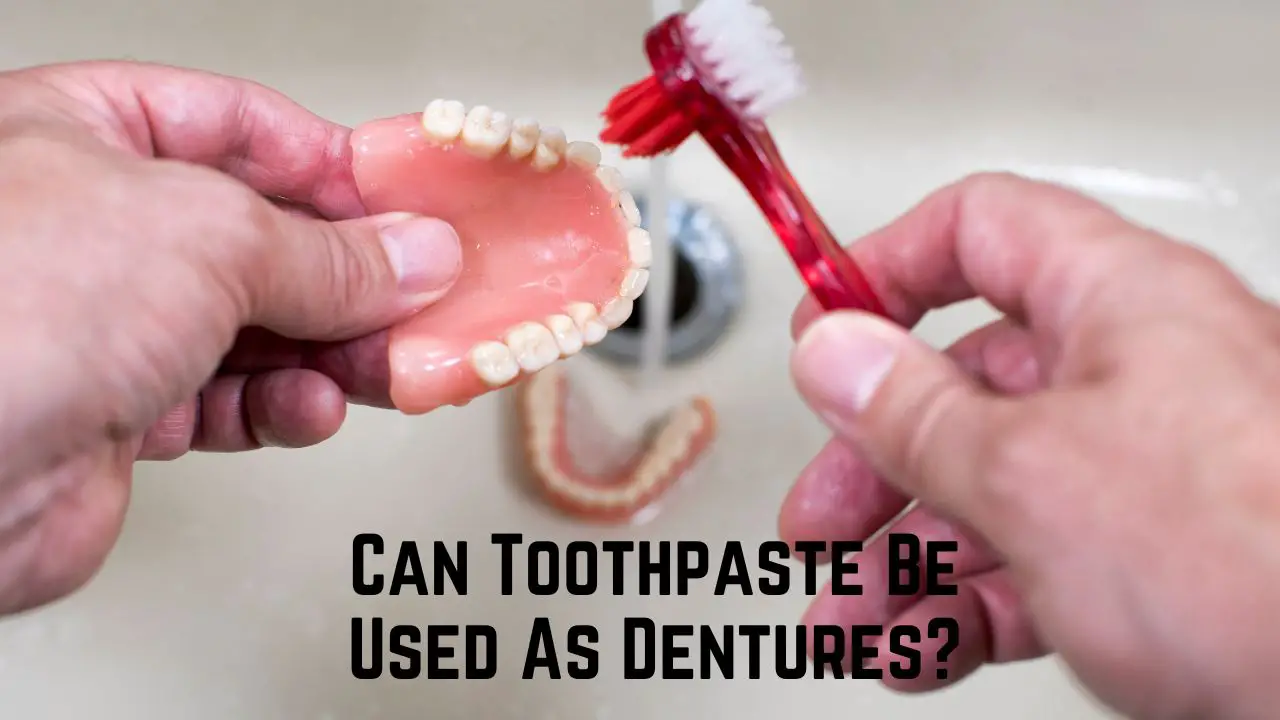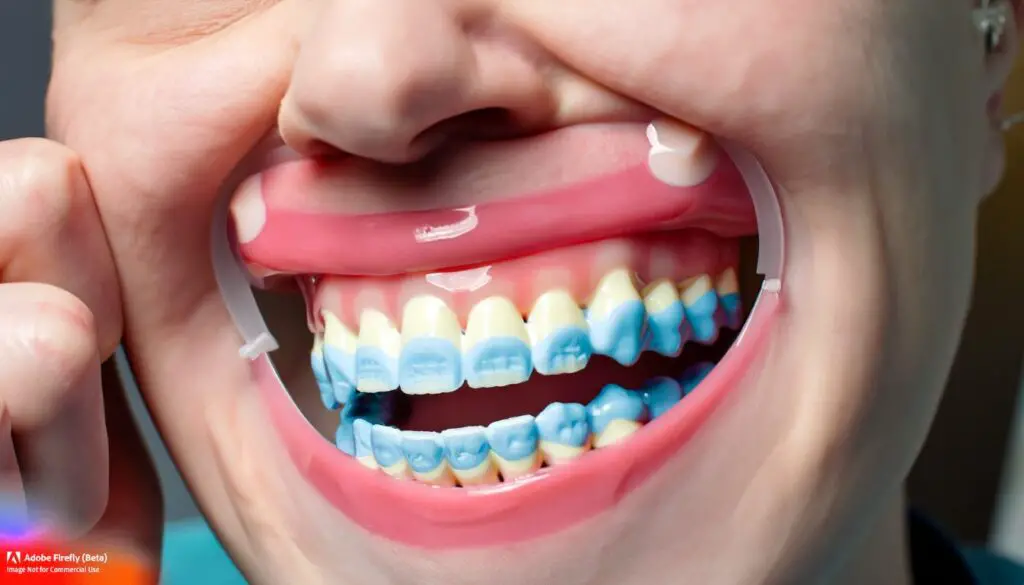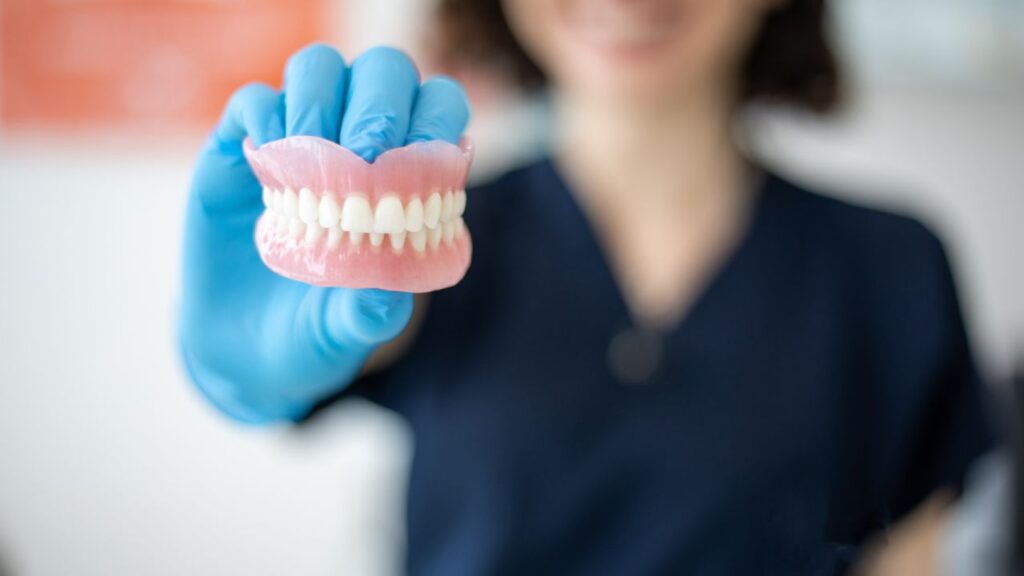
Having every tooth clean, shiny, and free of dental problems is a dream for many. For a lot of people, Dentures have become a crucial part of their life, adding to the aesthetic and practical appeal. For years now, Dentures have been allowing individuals to restore their ability to eat, speak, and confidently smile. This cornerstone of restorative dentistry offers a lifeline to individuals who have experienced tooth loss. Dentures are removable/ detachable dental appliances that have transformed multiple livers. However, there’s a weird question going around the corner, “Can Toothpaste Be Used As Denture”?
The question of whether Toothpaste can substitute for a Denture appears peculiar or unusual at first glance. However, what brings it around is the desire to explore potential alternatives to traditional denture solutions by many individuals. Some people who want a convenient and cost-effective method may often come around such weird queries. While the concept may seem unconventional, we right here are ready to guide you through.
Toothpaste cannot be used as a substitute for dentures. While Toothpaste is a teeth cleaning product, denture is a dental appliance/ device. None of them can substitute for each other in any sinful way.
Join us as we explore the idea of using Toothpaste as Dentures.
Table of Contents
Is Toothpaste a suitable alternative to denture adhesive?
No, Toothpaste isn’t an alternative to denture adhesive. Although Toothpaste can add a slight adhesive effect to dentures, it is extremely temporary. Toothpaste formulas’ aren’t meant for holding dentures securely, even for a few hours, let alone an entire day. It is advisable to use Denture Adhesives that are specifically designed to offer a strong and long-lasting bond between dentures and oral tissues.
Denture Adhesives
Denture adhesives are products designed to provide additional support, stability, and retention for dentures. These adhesives come in different forms, including creams, powders, or adhesive pads. Denture Adhesives are formulated with ingredients like Carboxymethylcellulose (CMC), Polyvinyl Acetate (PVA), Mineral Oil, Petrolatum, Zinc Salts, and Flavoring Agents. This formula creates a thin layer between the denture and the gums and thus enhances stability and prevents movement/ slippage. Denture adhesives can significantly improve the comfort and confidence of denture wearers, especially when eating or speaking.
Whereas toothpaste formulas lack necessary adhesive properties and thus aren’t a suitable alternative for denture adhesives. Depending solely on Toothpaste as a denture adhesive may lead to issues like discomfort, difficulty speaking or eating, and denture movement. Also, it is smart to follow the recommendations of dental professionals (dentists or prosthodontists) and use specifically designed denture adhesives to ensure optimal denture fit, stability, and overall oral health.

Can Toothpaste provide enough support and stability for dentures?
Toothpaste can offer temporary support and stability for dentures only under certain situations. However, Toothpaste isn’t designed specifically to replace denture adhesives or other such products. Toothpaste lacks the necessary strength and durability to provide consistent support throughout the day. The formula may lose its adhesiveness quickly when exposed to food, water, or even moisture from saliva.
Relying solely on Toothpaste as a long-term solution for denture stability isn’t advisable. Doing so can result in creating discomfort while eating or speaking. Not only that, the risk of denture movement or dislodgement also increases. It is important to ensure that the denture you are using is properly fit for its aesthetic as well as practical role.
Can you use regular Toothpaste for dentures?
For cleaning dentures, there are a range of Denture-specific cleaners available in the market. From paste/gel-based cleaners to cleaning brushes and machines, there are a lot of options to choose from. Denture cleaners are designed to remove stains, plaque, and bacteria from the device. These formulations don’t cause abrasion on the denture and thus clean without leading to any damage.
However, regular Toothpaste contains abrasive particles, and therefore, it isn’t advisable to use it for cleaning dentures. Toothpaste can result in can scratch or wear down the surface of dentures over time. Or it can result in developing a rough texture on the denture resulting in harboring more bacteria and stains. Not only that, but some toothpaste can also cause discoloration or deterioration of dentures.
Therefore, it is better to go with gentle, non-abrasive denture-specific cleaners only. Pick the one from your local medical store or purchase it online. Or, if unsure, consult your dentist or prosthodontist for a suitable denture cleaner.

How should I clean my dentures?
Cleaning dentures regularly and maintaining their hygiene is extremely important. Here’s a quick and easy process for the same:
- Firstly, remove dentures from your mouth and wash them under running water. Simply rinse them to ensure no loose food particles are left in them.
- Now take a denture-specific cleaner and use it to clean the dentures. Make sure you read the instructions provided with the cleaner for appropriate usage.
- Now using a soft bristle brush (ideally the one designated for denture cleaning), clean the denture thoroughly. Make sure you reach every tooth and gum area leaving no corner behind. However, avoid using a hard brush or your regular Toothpaste for the task.
- Once the cleaning is done, rinse the denture thoroughly under clean water.
- Some dentists or denture manufacturers also recommend soaking dentures overnight in a denture solution. If you are advised the same, do so. Soaking denture overnight removes stubborn stains and further disinfect the dentures.
- Now before you put the denture back in your mouth, rinse it again under tap water. Rinse again before wearing: Before putting your dentures back in your mouth, make
Remember to handle your dentures with care. Avoid dropping and damaging dentures at any cost. If you have any concerns or questions about denture cleaning, it is best to consult your dentist or prosthodontist for specific recommendations based on your denture type and individual needs.
Best Denture Cleaner in 2023
- iSonic F3900 Ultrasonic Denture/Aligner/Retainer Cleaner for all dental and sleep apnea appliances
- SmileDirectClub Smile Spa Ultrasonic and UV Cleaning Machine for Alingers, Retainers, Toothbrush Heads, and More
- Polident 3-Minute Antibacterial Denture Cleanser – Mint, 3-Minute Whitening, 120 Count
- Efferdent Retainer Cleaning Tablets, Denture Cleaning Tablets for Dental Appliances, Minty Fresh & Clean
- SmartGuard Premium Cleaner Crystals & Cleaning Case -(110 Cleanings)- Removes Stain, Plaque, & Bad Odor from Clear Braces, Dentures, Night Guards, Mouth Guard, & Retainers
- Ecardy Electric Dental Calculus Remover – Tartar Remover for Fighting Tartar – Tartar Scraper – Tooth Stains – Teeth Polishing
Bottom Line…
In conclusion, while Toothpaste may provide temporary solutions, it is not a suitable substitute for denture adhesives. It is better to go with a specific denture adhesive for a secure and long-lasting fit. Proper denture care products are recommended for optimal support and hygiene.

Hi, This is Lyn, I suffer from dental sensitivity for a very long time. PowerToothpaste.com is where I share my views of various toothpaste brands, along with tips on how to use toothpaste and what to look for when purchasing.
